by Rona | Jun 20, 2019 | Announcements, Appearances, KPFA, Podcasts, Radio Shows
How does a community heal from trauma, racism, and violence? And how can youth be an important part of the changes that are needed for healing, health, and hope!
Listen now to the show on 6/24/19 on About Health—KPFA.org 94.1FM, for a continuing look at social determinants of health:https://kpfa.org/player/?audio=313121
Youth who live with community violence experience heightened fear that they could be a target and that the world is an unsafe place. There are communities around the country that are notorious for homicides, and gang violence—places that are too dangerous for children to play outside, and for teens to feel respected and safe. Living in fear takes a toll on a person’s mental health, and ongoing stress can have serious physical consequences as well. Community violence and racism makes it much harder to live a healthy life! We will discuss what communities are doing to give teens a voice, agency, heal, and become change agents.
“West Contra Costa youth bear the burden of multiple health and social inequities. There is a harmful public narrative, promoted in both policies and the media, that youth of color are deficits, not assets, to the larger community.”
“Programming at RYSE is anchored in the belief that young people have the lived knowledge and expertise to identify, prioritize, and direct the activities and services necessary to thrive.”
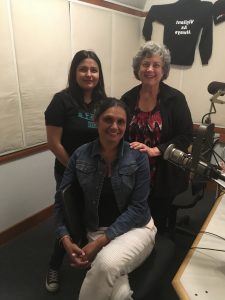
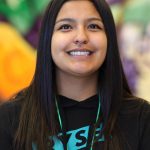
Dalia J. Ramos-Mucino has been the RYSE Member Engagement Coordinator since 2017. As Member Engagement Coordinator, Dalia is responsible for holding a friendly and positive culture within the space and with the youth. Dalia is passionate about creative expression in different forms like dancing, poetry, and storytelling. She will always work to ensure that RYSE is a safe, welcoming, and fun environment where youth feel open to express their thoughts and feelings. Before joining the RYSE staff, Dalia attended RYSE as a 14-year-old member and at 16 became an intern on the RYSE Leadership Team. She has been trained in Non-Violent Communication, Restorative Justice, and more.
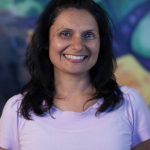
Kanwarpal Dhaliwal is one of the co-founders of RYSE and as the Associate Director, she supports and guides the implementation and integration of healing-centered practices, grounded in racial justice and liberation, across all of RYSE’s program areas. She also develops, promotes, and advocates for policies, investments, practices, and research that enliven healing, justice, and liberation across the fields and sectors in which RYSE works. Kanwarpal believes that the purpose of her work and life is to contribute to movements, communities, and legacies of liberation that honor the ancestors who fought for her existence and survival, and to forge a world that is just and gentle for future generations. Before joining RYSE, Kanwarpal received a Master’s Degree in Public Health, and now serves as adjunct faculty at San Francisco State University.
by Rona | Mar 27, 2019 | Appearances, KPFA, Podcasts, Radio Shows
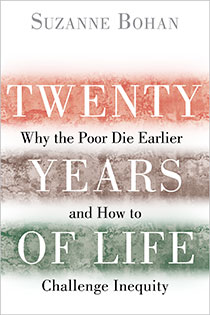
On About Health, 4/1/19 we discussed the social determinants of health, and how some communities are coming together to build a better life!
“The strain of living in a poor neighborhood, with subpar schools, lack of parks, fear of violence, and few to no healthy food options, is literally taking years off of people’s lives.” —Twenty Years of Life
Good health is not just an individual choice. Where you live, your access to healthy food, your exposure to toxins, your children’s ability to play outside, your chronic stress, your income, and the quality of schools, all impact the health of your family. We need to rethink the root causes of disease.
Guests:

Suzanne Bohan, author of Twenty Years of Life, covered health and science for twelve years with the Bay Area News Group, which includes the San Jose Mercury News, Contra Costa Times, and OaklandTribune. She has won nearly twenty journalism awards, including a White House Correspondents’ Association award for her reporting on health disparities. She has a master’s degree in journalism from Stanford and a bachelor’s degree in biology. Suzanne Bohan is coauthor of 50 Simple Ways to Live a Longer Life: Everyday Techniques from the Forefront of Science.
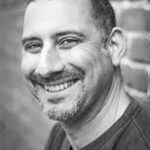
Jason Corburn, PhD, is a Professor at the University of California, Berkeley, jointly appointed in the Department of City & Regional Planning and the School of Public Health. He directs Berkeley’s Institute of Urban and Regional Development, a joint Master of City Planning (MCP) and Master of Public Health (MPH) degree program, and he leads the Center for Global Healthy Cities. His research focuses on the links between environmental health and social justice in cities, notions of expertise in science-based policy making, and the role of local knowledge in addressing environmental and public health problems. To learn about Jason’s extensive experience and publications go to https://www.jasoncorburn.com.
by Rona | Jan 11, 2017 | Announcements, KPFA, Podcasts, Radio Shows
If you missed the January 16th show on KPFA about The Roots of Health Disparities you can hear it now at https://kpfa.org/player/?audio=251021
 “Of all the forms of inequality, injustice
“Of all the forms of inequality, injustice
in health care is the most shocking and
inhuman.”
—Dr. Martin Luther King Jr.
“Decades of racially discriminatory policies have marginalized people of color in every way, including in areas of housing, transportation, education, employment, and health. In spite of civil rights laws passed 50 years ago—people of color still face barriers on nearly every quality-of-life measure.”
—”Health Equity As a Critical Civil Rights Issue,” PolicyLink, 2015
GUESTS:
Dr. Muntu Davis is the Public Health Department Director and County Health Officer in Alameda County, California. He advises the County Board of Supervisors, local government agencies, and community members and organizations on medical and public health issues and on the development and implementation of public health policy and practices. He also provides oversight, strategic direction, and fiscal management of the department and all of its divisions. He joined the ACPHD in October 2005. Prior to working Alameda County, he worked in the Immunization Branch of the California Department of Health Services on pandemic planning and education on febrile rash evaluation. He also practiced medicine in urban and rural primary care and urgent care clinics in Northern and Southern California. He held multiple positions at the Continuity of Instruction to Reinforce Our Children’s Learning Environment (C.I.R.C.L.E.) program at the Tom Bradley Elementary School including co-director and member of the board of directors. Dr. Davis completed a residency in Family Medicine at Presbyterian Intercommunity Hospital in Whittier, California. He completed The California Endowment Scholars in Health Policy Fellowship and received his Master of Public Health degree from Harvard School of Public Health.
Dalila Butler, Associate Director, works with the PolicyLink Center for Health Equity and Place to promote social, economic and health equity through environmental and policy change, particularly in low-income communities and communities of color. Dalila serves as the California Department of Public Health Office of Health Equity Advisory Committee Chair. She also provides technical assistance to communities across the country and supports research and writing for health team projects. She supports the Boys and Men of Color team by working with networks in advancing policy and practice to advance equity in the areas of health, education, employment, and juvenile justice. Prior to joining PolicyLink, Dalila supported health equity projects at Prevention Institute. She holds a B.S. in Chemical Engineering from North Carolina State University and a Masters in Public Health from San Diego State University.
by Rona | Sep 30, 2016 | Announcements, Appearances, KPFA, Podcasts, Radio Shows
You can listen to today’s show (Oct.2, 2016)
“About Health” on KPFA radio
 Your health and the health of your community is affected by many factors.
Your health and the health of your community is affected by many factors.
We know that health care is essential for all, but it is only one health determinant. There is a broad range of social, economic, racial, and environmental factors that can support or hinder healthy outcomes.
How do we get to greater health equity? Join us for this important conversation.
“The social determinants of health are the conditions in which people are born, grow, live, work and age. These circumstances are shaped by the distribution of money, power and resources at global, national and local levels.–“World Health Organization”
My Guests:
Dr. Dayna Long is the Medical Director at the Center for Community Health and Engagement at UCSF Benioff Children’s Hospital Oakland, where she is also an Attending Physician. Her career has been dedicated to addressing health inequities that affect families and young children. In addition to her role as pediatrician, she also serves as a steering committee member of First Five-Alameda County/Help Me Grow, Medical Director at the Center for Community Health and Engagement, Co-founder and Medical Director of the Family Information and Navigation Desk, UCSF Benioff Children’s Hospital Oakland Spokeswoman for the Too Small to Fail: Talk, Read, Sing Initiative….and much more. You can find out more about her at http://www.childrenshospitaloakland.org/main/find-a-doctor/long-dayna-a-md-473.aspx
Anna Gruver, LCSW, is the Maternal, Paternal, Child, and Adolescent Health (MPCAH) Coordinator and Health Care Services Administrator at Alameda County’s Public Health Department. She is a bi-lingual, bi-cultural Licensed Clinical Social Worker who has worked in the field of social work focusing on children and families for more than 20 years. As the MPCAH Coordinator and Alameda County Healthy Start Initiative Project Director she leads the integration of maternal child/early childhood family support services for pregnant women and families with young children; looking closely at social determinants of health and the strength of families.
MPCAH enhances access to comprehensive, quality health care and focuses on early intervention and prevention services. The goal is to reduce health disparities, protect and improve health outcomes among Alameda County families, including pregnant women, parenting women and men, and their children.
 —RYSE Center https://rysecenter.org/
—RYSE Center https://rysecenter.org/






 “Of all the forms of inequality, injustice
“Of all the forms of inequality, injustice Your health and the health of your community is affected by many factors.
Your health and the health of your community is affected by many factors.